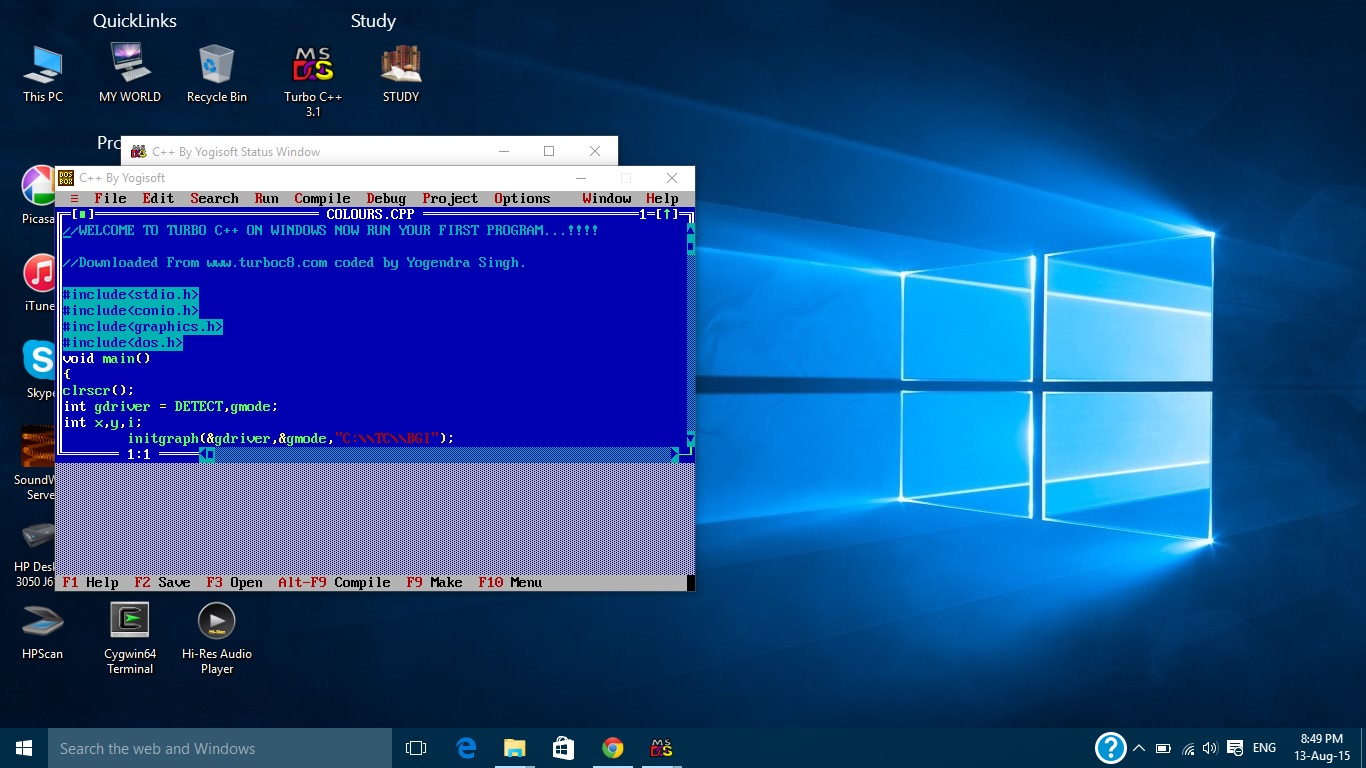Borland Turbo Basic Compiler Download

Turbo basic compiler free download. 195 programs for 'turbo basic compiler'. This project presents clone of the Borland Turbo C/C++ or Embarcadero C++.

Turbo C++ is a discontinued C++ compiler and integrated development environment and computer language originally from Borland. Most recently it was distributed by Embarcadero Technologies, which acquired all of Borland's compiler tools with the purchase of its CodeGear division in 2008. Turbo C++ 3.0 was released in 1991 (shipping on November 20), and came in amidst expectations of the coming release of Turbo C++ for Microsoft Windows. Initially released as an MS-DOS compiler, 3.0 supported C++ templates, Borland's inline assembler, and generation of MS-DOS mode executables for both 8086 real mode and 286 protected mode (as well as the Intel 80186.) 3.0 implemented AT&T C++ 2.1, the most recent at the time. The separate Turbo Assembler product was no longer included, but the inline-assembler could stand in as a reduced functionality version. All Turbo C++ reviews, submitted ratings and written comments become the sole property of Windows 7 download. You acknowledge that you, not windows7download, are responsible for the contents of your submission.
However, windows7download reserves the right to remove or refuse to post any submission for any reason. Windows 7 Download periodically updates pricing and software information of Turbo C++ full version from the publisher, but some information may be out-of-date. You should confirm all information. Using warez version, crack, warez passwords, patches, serial numbers, registration codes, key generator, pirate key, keymaker or keygen for Turbo C++ license key is illegal and prevent future development of Turbo C++. Download links are directly from our mirrors or publisher's website, Turbo C++ torrent or shared files from free file sharing and free upload services, including Rapidshare, MegaUpload, YouSendIt, SendSpace, DepositFiles, DivShare, HellShare, HotFile, FileServe or MediaFire, are not used.
Contents • • • • • • • • • • • • • • • • • • • • • • • • • History [ ] The first version of the DOS compiler was published as BASIC/Z, the very first interactive compiler for CP/M and MDOS. Later it was extended to MS-DOS/PC DOS and in 1987 distributed it as Turbo Basic. Turbo Basic was originally created by Robert 'Bob' Zale (1945–2012) and bought from him. When Borland decided to stop publishing it (1989), Zale bought it back from them, renamed it to PowerBASIC and set up PowerBASIC Inc.
To continue support and development of it; it was later called PBDOS. PowerBASIC went on to develop Basic compilers for Windows, first PBWIN — their flagship product — then PBCC, described below. On November 6, 2012, Robert Zale, the creator of PowerBASIC, died. For a time, it was assumed that the company might cease operations. His wife, Mrs.
Vivian Zale, posted on 8 March 2014 to the PowerBASIC forums a statement that the company would continue in operation. On May 10, 2015, Mrs. Zale announced that work was continuing on new versions of PowerBASIC compilers. On November 2, 2016, Vivian Zale announced her intention to begin seeking a buyer for the company.
The active development of the next generation of PowerBASIC products is now stopped and they no longer expect to release PBWin11/PBCC7, which were already in beta testing when Bob Zale died, nor the 64-bit compilers or PB/Pro (PBWin and CC in one compiler) which were still in the alpha stages. On January 31, 2017, Adam Drake announced Drake Software had acquired the PowerBasic source code from PowerBasic, Inc., with the intention of updating and improving the functionality of the product. This was later confirmed by Vivian Zale with a forum post thanking the members for their support. Serial magix fotos en cd y dvd 9 deluxe cake maker. Compilers [ ] PowerBASIC programs are self-contained and use no runtime file to execute. In all versions of the compiler the applications compile without external libraries, though you can use such libraries if desired. PBDOS creates 16-bit files, while PBWIN and PBCC create 32-bit (PE) files.